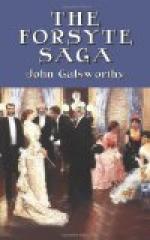James shook his head. “Ah!” he said, “I don’t know how they live!”
Old Jolyon had risen, and, cigar in mouth, went to inspect the group at close quarters.
“Wouldn’t have given two for it!” he pronounced at last.
Soames saw his father and Nicholas glance at each other anxiously; and, on the other side of Swithin, Bosinney, still shrouded in smoke.
‘I wonder what he thinks of it?’ thought Soames, who knew well enough that this group was hopelessly vieux jeu; hopelessly of the last generation. There was no longer any sale at Jobson’s for such works of art.
Swithin’s answer came at last. “You never knew anything about a statue. You’ve got your pictures, and that’s all!”
Old Jolyon walked back to his seat, puffing his cigar. It was not likely that he was going to be drawn into an argument with an obstinate beggar like Swithin, pig-headed as a mule, who had never known a statue from a—–straw hat.
“Stucco!” was all he said.
It had long been physically impossible for Swithin to start; his fist came down on the table.
“Stucco! I should like to see anything you’ve got in your house half as good!”
And behind his speech seemed to sound again that rumbling violence of primitive generations.
It was James who saved the situation.
“Now, what do you say, Mr. Bosinney? You’re an architect; you ought to know all about statues and things!”
Every eye was turned upon Bosinney; all waited with a strange, suspicious look for his answer.
And Soames, speaking for the first time, asked:
“Yes, Bosinney, what do you say?”
Bosinney replied coolly:
“The work is a remarkable one.”
His words were addressed to Swithin, his eyes smiled slyly at old Jolyon; only Soames remained unsatisfied.
“Remarkable for what?”
“For its naivete”
The answer was followed by an impressive silence; Swithin alone was not sure whether a compliment was intended.
CHAPTER IV
PROJECTION OF THE HOUSE
Soames Forsyte walked out of his green-painted front door three days after the dinner at Swithin’s, and looking back from across the Square, confirmed his impression that the house wanted painting.
He had left his wife sitting on the sofa in the drawing-room, her hands crossed in her lap, manifestly waiting for him to go out. This was not unusual. It happened, in fact, every day.
He could not understand what she found wrong with him. It was not as if he drank! Did he run into debt, or gamble, or swear; was he violent; were his friends rackety; did he stay out at night? On the contrary.
The profound, subdued aversion which he felt in his wife was a mystery to him, and a source of the most terrible irritation. That she had made a mistake, and did not love him, had tried to love him and could not love him, was obviously no reason.




